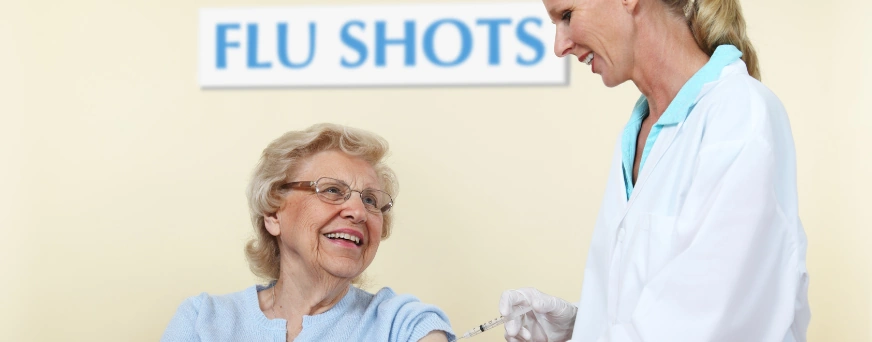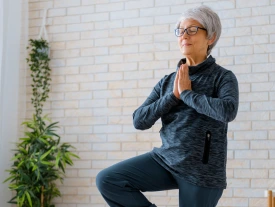Why Seniors Shouldn’t Skip The Flu Shot Especially This Year
Flu season is rough for everyone, but especially for seniors who may not have the best immune systems. Every year, older adults face heightened risks from influenza. Getting seniors their flu shots is an easy and effective way to safeguard health. If it’s been some time since you or a loved one sought out the vaccine, learn why you should get it, where to get it, and what to do afterward.
Why Seniors Need A Flu Shot
Our immune systems weaken as we age, making seniors more susceptible to the flu and its complications. The CDC reports that those 65 and older make up a large portion of flu-related hospitalizations and deaths annually. Getting a senior flu shot is a vital preventive measure.
The vaccine helps lessen the severity of the flu and reduces the risk of complications like pneumonia and bronchitis. The shot can also lower the chance of hospitalization and even reduce the risk of heart attacks for those with heart conditions. Additionally, it prevents the flu from spreading, especially in places like nursing homes where close living quarters can accelerate transmission.
How The Flu Shot Works

The flu shot introduces the body to a small, harmless piece of the virus, selected specifically based on which flu strains are most likely to appear during the current season. The vaccine is enough to trigger the immune system to respond like a real infection. When it encounters these inactivated virus particles or proteins, the immune system produces antibodies. These antibodies remain in the body, ready to recognize and fight off the real virus if exposure occurs later in the season.
Many seniors’ immune responses may naturally be slower or weaker compared to when they were younger, making this preemptive boost a major help. It equips their bodies with the tools to combat the flu more effectively, reducing the likelihood of severe illness or complications. Furthermore, widespread vaccination helps achieve herd immunity, offering protection to those who cannot receive the vaccine themselves due to medical conditions.
When And Where To Get A Senior Flu Shot
The CDC recommends that seniors receive their flu vaccination by the end of October each year. This timing allows the body to develop immunity before the flu season peaks, typically between December and February. However, if you miss this window, vaccinating later can still offer protection, as flu viruses can circulate well into the spring.
You can easily access flu shots at several convenient locations. Seniors can visit their primary care physician's office, local pharmacies, or community health clinics to receive the vaccine. Many of these locations offer walk-in appointments, making it easier for seniors to get vaccinated without scheduling far in advance. Some community centers and senior organizations also host flu shot clinics, providing free or low-cost vaccinations to ensure all seniors can access this important preventive measure. It's worth checking with your healthcare provider or local health department for specific details on where to receive a flu shot in your area.
Considerations For Seniors
While generally safe, seniors should discuss allergies or past vaccine reactions with their healthcare provider before getting a flu shot. Mild side effects like soreness or a low-grade fever are common and usually resolve quickly.
Doctors might recommend a high-dose flu vaccine for those with chronic health issues. This version contains more antigen to elicit a stronger immune response. This may intensify side effects, but they are unlikely to cause harm.
Myths And Facts About The Senior Flu Shot

Addressing and correcting myths about the flu vaccine is necessary to encourage more seniors to get vaccinated. One misconception that some people believe is that if they've never had the flu, they don't need the shot. This is not true, as the flu virus is unpredictable, and immunity can decrease over time, making annual vaccination important for sustained protection.
A common myth is that the flu shot causes the flu, stemming from misunderstanding of what is in a vaccine. The flu shot contains inactivated virus components and cannot cause the illness. The worst that can happen in the vast majority of cases is minor side effects.
Another myth is that the flu shot is ineffective. While no vaccine offers complete protection, it significantly reduces the risk of severe illness and complications. Annual vaccination is crucial as flu strains change each year.
Another misconception is that healthy seniors don't need the flu shot. In reality, even healthy individuals can carry the virus and unknowingly spread it to more vulnerable populations. Vaccination protects the individual and the community, especially those who cannot receive vaccines for medical reasons.
Some seniors might think the flu shot is unnecessary because they believe it is just a bad cold. However, the flu is much more severe and can lead to serious health complications, particularly in older adults. It may be possible to recover without the vaccine, but being vaccinated increases the chances of recovery while reducing the severity of an infection.
Additional Resources And Support
Seniors looking for additional support can turn to various organizations dedicated to promoting health and well-being among older adults. The National Council on Aging (NCOA) offers valuable information on preventive health services, including flu vaccinations, and can guide seniors in accessing these services. Additionally, the AARP provides resources and advocacy to ensure seniors receive the necessary healthcare, including information on flu shots and other vaccinations.
Local senior centers are excellent places to find support and information. They may host informational sessions about the flu vaccine and even organize group trips to vaccination clinics, making it easier for seniors to get vaccinated. For those who prefer online resources, websites like vaccines.gov can help locate nearby vaccination sites and provide details about vaccine availability.
Conclusion
The flu shot is necessary to protect older adults from severe influenza consequences. By getting vaccinated, seniors protect themselves and support community health. Prioritizing the flu shot and using available resources can help ensure a healthier flu season for everyone.























